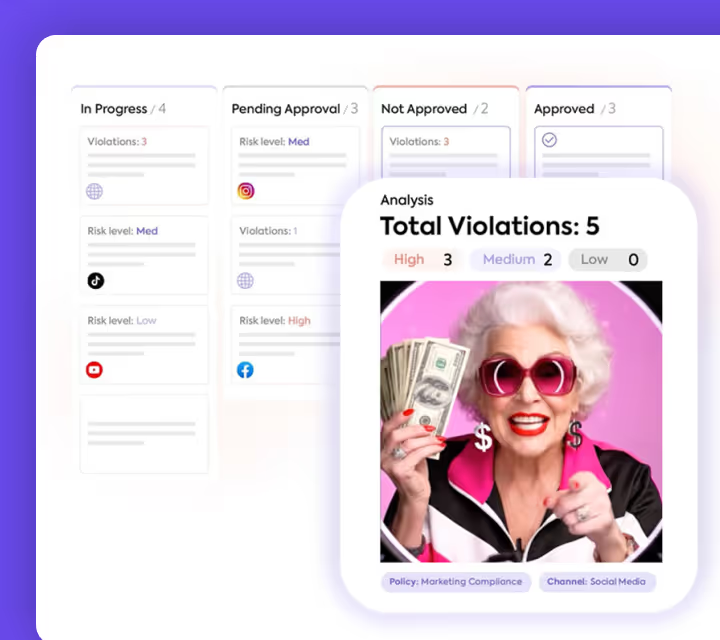For CMOs in financial services, understanding SEC and FINRA advertising rules is crucial to creating compliant marketing campaigns. These rules cover everything from disclosures to filing requirements, especially for complex investment vehicles like collateralized mortgage obligations (CMOs) and real estate mortgage investment conduits (REMICs). This article serves as a financial marketing compliance guide to help CMOs meet SEC advertising rules for financial services and maintain effective FINRA ad compliance.
Key Disclosure Requirements CMOs Must Follow in SEC and FINRA Advertising Rules
Disclosure is at the heart of SEC and FINRA advertising rules. CMOs must ensure that all advertisements and retail communications include clear and accurate disclosure statements to inform investors about the nature and risks of the investment products. This is especially important for complex investment vehicles such as collateralized mortgage obligations and real estate mortgage investment conduits.
Required disclosures typically cover risk factors, fees, potential conflicts of interest, and any material facts that could influence an investor’s decision. Failure to provide adequate disclosure can lead to communications being deemed false or misleading, exposing firms to regulatory penalties and damaging investor trust.
CMOs should work closely with compliance teams to verify that all marketing materials meet the disclosure standards set by FINRA Rule 2210 and relevant SEC rules. This collaboration helps protect investors by ensuring transparency and promoting regulatory compliance.
The SEC and FINRA Regulatory Framework for Financial Advertising
The SEC establishes advertising rules to regulate how securities are marketed, ensuring that advertisements are not false or misleading. These rules apply to broker-dealers and other entities involved in the sale of securities. Understanding both SEC advertising rules for financial services and FINRA ad compliance is essential for CMOs developing compliant marketing campaigns.
FINRA, through FINRA Rule 2210 and other NASD rules, oversees communications by broker-dealers, setting standards for retail communication and public communications. FINRA requires firms to file certain retail communications with FINRA’s Advertising Regulation Department before first use and to provide notice to members as appropriate.
CMOs must stay updated on the latest from finra.org, where FINRA often requests comments on proposed changes to advertising rules. This helps firms stay compliant with evolving standards.
Key Terms CMOs Should Know
- Broker-dealers and broker-dealer firms are responsible for compliance with SEC and FINRA advertising regulations.
- An investment vehicle like a collateralized mortgage obligation or real estate mortgage investment conduit requires detailed disclosures due to its complexity.
- Institutional investors may receive communications that differ from those sent to retail investors, but must still adhere to core disclosure standards.
- Registered principals are tasked with reviewing and approving advertising materials to ensure compliance.
- A representative for information on CMOs often serves as a compliance liaison during marketing review processes.
Dos and Don’ts for CMOs in SEC and FINRA Advertising Compliance
Dos
- Do ensure that all advertisements include a clear disclosure statement that meets SEC and FINRA disclosure standards.
- Do follow FINRA’s filing requirements carefully by submitting retail communications to the advertising regulation department before first use.
- Do coordinate with your registered principal and compliance team when preparing campaigns involving complex securities or new investment products.
- Do monitor updates and participate in comment periods when FINRA requests comment on changes to advertising rules.
- Do protect investors by avoiding false or misleading information and by including material risk disclosures in all public communications.
Don’ts
- Don’t fail to file required retail communications with FINRA according to FINRA Rule 2210 and NASD rules.
- Don’t omit important disclosures related to investment risks or the nature of securities like collateralized mortgage obligations.
- Don’t make unsubstantiated claims in advertisements or sales literature that could mislead investors.
- Don’t ignore the specific filing requirements for retail communication versus institutional investor communications.
- Don’t overlook the importance of working with a representative for information on CMOs and other specialized products.
How CMOs React to Advertising Compliance Requirements
CMOs recognize that understanding and implementing SEC and FINRA advertising rules is a vital part of launching compliant campaigns. Many CMOs work closely with compliance officers and registered principals to ensure that all advertisements and communications adhere to disclosure standards and filing rules.
Marketing teams face challenges balancing creativity with compliance, especially when dealing with complex investment vehicles like collateralized mortgage obligations or real estate mortgage investment conduits. Effective CMOs embrace these regulations to protect investors and avoid regulatory sanctions.
Best Practices for CMOs to Navigate FINRA Filing Requirements and Avoid Compliance Pitfalls
Navigating filing requirements under FINRA Rule 2210 is a key responsibility for CMOs in financial services marketing. Certain retail communications must be submitted to FINRA’s Advertising Regulation Department prior to first use, especially when promoting complex products like CMOs.
To streamline compliance and avoid delays, CMOs should:
- Identify which communications require filing versus those that only need notice to members.
- Collaborate with registered principals who must review and approve marketing materials.
- Submit filings promptly through FINRA’s system and track approval statuses.
- Stay updated with regulatory changes by monitoring finra.org and responding to FINRA requests for comment.
Following these best practices reduces the risk of regulatory sanctions and helps CMOs launch compliant campaigns efficiently, safeguarding both investors and their firms.
Common Compliance Challenges and Solutions
- Filing Requirements: Many CMOs are surprised by the volume of retail communications that must file certain retail communications with FINRA before first use. Failure to comply risks penalties and delays.
- Disclosure Complexity: CMOs must ensure every communication, from sales literature to advertisements, includes appropriate disclosure statements that clearly explain risks and other material information.
- Staying Current: With FINRA requests comment periods and updates on finra.org, CMOs must stay engaged and update marketing materials accordingly.
- Broker-Dealer Coordination: CMOs must collaborate closely with broker-dealers and their registered principals to ensure all marketing materials meet both SEC and FINRA rules.
Interactive Quiz: Is This Compliant?
- A broker-dealer prepares an advertisement for a collateralized mortgage obligation but omits key risk disclosures. Is this compliant?
Answer: No. Omitting disclosure statements violates both SEC and FINRA advertising rules. - A CMO files all required retail communication materials with FINRA’s Advertising Regulation Department before first use. Is this compliant?
Answer: Yes. Filing prior to first use is mandatory under FINRA Rule 2210. - Sales literature targeted at institutional investors includes appropriate disclosures but is not filed with FINRA. Is this compliant?
Answer: Generally, yes. Institutional investor communications have different filing requirements but must still meet disclosure standards. - An advertisement contains exaggerated claims about an investment vehicle's returns and omits mention of risk. Is this compliant?
Answer: No. This is considered false or misleading under SEC and FINRA rules. - A marketing team ignores filing requirements and launches an advertisement without compliance approval or review. Is this compliant?
Answer: No. Review by a registered principal and compliance with filing rules is required.
Essential Compliance Insights for CMOs
Following this financial marketing compliance guide helps CMOs manage SEC advertising rules, financial services, and maintain strong FINRA ad compliance. CMOs must be well-versed in SEC advertising rules, financial services and FINRA ad compliance to manage compliant marketing campaigns effectively.
By staying informed through finra.org, working closely with broker-dealers and registered principals, and following FINRA Rule 2210 and NASD rules, CMOs can ensure all advertisements and public communications meet regulatory standards.
To streamline compliance workflows and accelerate campaign approvals, CMOs can leverage solutions like Sedric AI, which offers real-time pre-review of marketing content to reduce legal bottlenecks and ensure adherence to complex advertising regulations.


_11zon.jpg)




